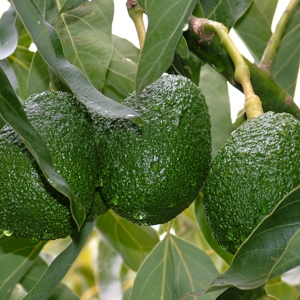Climate change will change what farmers can and will grow in various parts of the world. But the first detailed study of how warmer, drier weather will affect a specific region has just surfaced. And it pre-dicts a much different UK than we know now!
 Will London become the new Los Angeles, where folks have avocado trees in their
Will London become the new Los Angeles, where folks have avocado trees in their
back gardens instead of Apples? And make their own Guacamole every day?
If scientists at the UK Centre for Ecology & Hydrology are right, the UK will still be a major agricul-tural power in the warmer, drier future. But what farmers are growing will change dramatically…
London the new Los Angeles?
Latest projections show the UK will still be a land of plenty in 2080. But 5o years hence, farmers will be focusing on chickpeas, soy beans and oranges – crops that are traditionally grown in warmer parts of the world. And that’s good. Because those of us currently struggling with the idea of transitioning from animal to plant-based protein sources will be looking top such foods as our ‘new staples’.
What they did
Researchers leveraged the best information they have about where the climate is going to come up with an unprecedentedly detailed map of the UK will look like environmentally by 2080.
The official goal was to investigate the future suitability, for over 160 existing and new food crops, of different regions of the UK under likely warming scenarios of 2 to 4 degrees Celsius compared to pre-industrial times.
The modelling study, part of the OpenCLIM research project, is the most comprehensive of its kind to date. It provides mapped projections for every square kilometre of the island nation, providing val-uable information to the farming and food sectors on the future opportunities and challenges.
“Our climate is expected to change substantially over coming decades at a time when there will be rising demand for food due to population growth,” Study report lead author Dr. John Redhead, says. “It is therefore essential that arable farming becomes more resilient; one possible solution is growing different crops that are more suited to the new local conditions.”
What they found
The study’s key findings include:
- Climate change will result in increased suitability for many current and potential new crops across much of the UK.
- However, some key produce is likely to become harder to grow in the South East and East Anglia, currently the UK’s most productive arable regions.
- There would be substantial increases in suitability for a broad range of crops not currently widely grown in the UK – such as sunflowers, Durum wheat, soybeans, chickpeas, citrus fruit and okra – as well as wine grapes.
The takeaway
“Clearly, it’s unlikely to be feasible just to switch large-scale food production from Britain’s agricul-tural heartlands of southeastern England to Scotland, for example,” Redhead observes. “However, climate change is happening now, and its impacts will increase by 2080. “So whatever action is taken will involve big challenges in terms of where our food comes from and the way our agricultural landscapes are managed.”
Those will likely include:
- The need for further research into the viability of the crops that are identified as ‘winners’.
- Changing our agricultural supply and distribution networks to better support farmers growing new crops in new locations.
- Adopting new agricultural systems including indoor vertical farming.
- Breeding and growing more heat- or drought-resilient varieties of existing staple crops.
My take
Redhead challenges the study report’s readers to imagine a Britain where folks make their own hum-mus from locally-grown chickpeas. There is an abundance and variety of citrus fruits, avocados, hot and sweet peppers, and other produce not currently grown there. And domestically-produced soy products such as tofu are commonplace.
I can see the same thing happening in certain parts of Canada by the 2080s. But at the same time, parts of the US south – particularly regions that are already marginal for agricultural use – may become totally unsuitable. The upheaval will be monumental.
Redhead’s cautions about starting to prepare now for the inevitable warmer, drier future apply as much to North America as they do to the UK. Europe and Asia.
I wonder how regions and cultures such as India, Southeast Asia and Australia will fare under the conditions of the future…
~ Maggie J.

